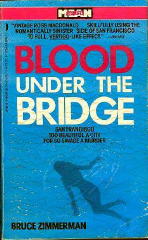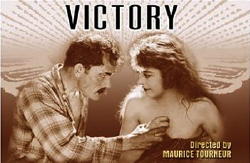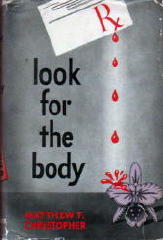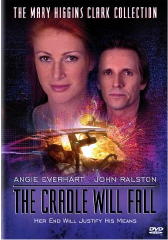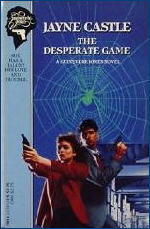December 2008
Monthly Archive
Fri 19 Dec 2008
THE MURDER OF ROGER ACKROYD. TV movie/episode of Agatha Christie: Poirot. First shown in the UK on 2 January 2000 [Season 7, Episode 1]. David Suchet, Philip Jackson, Oliver Ford Davies, Selina Cadell, Roger Frost, Malcolm Terris, Nigel Cooke, Daisy Beaumont, Flora Montgomery. Based on Agatha Christie’s novel of the same name. Screenwriter: Andrew Grieve. Director: Clive Exton.
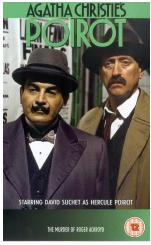
It’s been a long time since I first read the book — something like 55 years ago — and it was also the last time. This is one of only two detective novels for which I remember the ending and who did it, and the other was by Agatha Christie also.
Which is why the book has been only a one-time affair for me. The details I don’t remember, but I do remember Hercule Poirot — it was probably my introduction to him, but I couldn’t swear to that — and once you’ve read a novel he’s in, if you’re a detective story fan of any kind, he’s a character you’ll also never forget.
Confession time. I’ve never seen David Suchet as Poirot until now. Pure negligence on my part, or a certain lack of resolve, whatever. Right now, at the moment, I am typing this, I’m a convert. 100 percent. Suchet is Hercule Poirot, to the ultimate and finest detail.
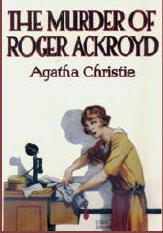
If you know the story about Roger Ackroyd’s murder, and without my saying more, I am assuming that you do, you might wonder how it could be filmed. If it were up to me, I’d do as direct an adaptation as I could, but Andrew Grieve goes at it sort of sideways and this misses the point of the tale entirely. (At the beginning of the film Poirot is reading from the killer’s diary.)
The characters in this film are among those that are also in the book, but some research into other reviewers’ commentaries say that not all of the characters in the book are in the movie, present and accounted for.
There is also an extra murder that is not in the book (or again, so I’m told). And on my own, with no help from others, I certainly did not recognize the shootout in the chemical factory between the killer on one side at the end, and Poirot and Inspector Japp (Philip Jackson) on the other. Good grief. What were they thinking?
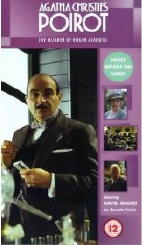
I also wondered about the scene in Poirot’s old semi-abandoned city apartment (the movie begins as he’s “enjoying” his retirement far out in the country). Poirot seems choked up about the place, the furniture covered in sheets, with bad memories flooding his mind. What was that all about? (Perhaps it has to do something with the fact that I started watching the Suchet series with Season 7?)
All in all, I suppose one could easily enjoy this made-for-TV movie if one did not know the story, nor the character, ahead of time. I can usually tune things out so that I can watch the film the screenwriter and director want to tell while I’m watching, which I did just fine. But why on earth did they want to tell this one?
I exclude David Suchet from blame. Even if he had something to say about the story, I’m going to say he didn’t, and I’m looking forward to his next outing in the boxed set I just bought myself as an early Christmas present.
Thu 18 Dec 2008
BRUCE ZIMMERMAN – Thicker Than Water.
Detective Book Club; reprint hardcover [3-in-1 edition]. First edition: HarperCollins, 1991. Paperback reprint: Harper, 1993.
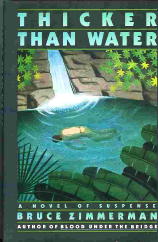
In the five year period from 1989 to 1994, Bruce Zimmerman wrote four mystery thrillers featuring phobia therapist Quinn Parker, but since then he seems to have disappeared. Or at least I’ve found nothing more about him than what’s in Al Hubin’s Crime Fiction III, even using a quick search on the Internet. The four books and nothing more. [See also the UPDATE below.]
From the book at hand, the second in the series, Zimmerman seems to have been aiming at the moderately-boiled Travis McGee market. Treating phobia patients as a profession seems to be a good way of getting the San Francisco based Parker into all kinds of scrapes, but in this book, nothing is made of it.
Parker gets involved this time when he gives a good buddy a hand after he inherits a half-million dollar estate in Jamaica and finds there are exceedingly dangerous strings attached.
Zimmerman is very good at thumbnail dead-on descriptions of the people found in his books, and more than once I was brought suddenly to attention by a plot twist that was (to say the least) unexpected. But as a detective, Quinn Parker is — well, if inept is not quite the right word, then to say the least, he’s not very good at it. One additional death, if not two, can be attributed directly to Parker’s entirely unsavvy approach to the business at hand.
Worse, he seems all but blithely unaware of it. He swallows hard, and it’s on to the next chapter. Nor is the ending particularly neat and tidy, with one explanation in particular producing (in my mind) many more questions than answer.
From mind-boggling turns of plot to mind-blowing maladroitness, that’s the mix. Worth spending an evening’s reading time on, but not likely to be remembered strongly by more than a few of those who do.
— December 2002 (very slightly revised)
[UPDATE] 12-18-08. First of all, notice that I referred to Crime Fiction III in this review. The latest edition of Al Hubin’s book (but available only on CD) is the Revised Crime Fiction IV.
Secondly, either the Internet contains more than it did six years ago, or I’m getting better at Google. Was Google around six years ago? Maybe not. Either way, I found out why there were four Quinn Parker mysteries (as stated in the review) and only four.
Bruce Zimmerman, as it turns out, discovered Hollywood, or Hollywood discovered him. To his lasting great fortune, Zimmerman started writing for TV in 1998, and in 2000 he turned producer. Series to his credit in the latter capacity (thanks to IMDB) include The District, Judging Amy, Desperate Housewives, CSI: NY, and K-Ville. (I really liked that last series, a cop show taking place in New Orleans, but I think I was the only one. After last year’s writers’ strike, it never returned.)
And thanks to the previously mentioned Crime Fiction IV, slightly expanded, here’s a list of the mystery novels that Bruce Zimmerman produced:
ZIMMERMAN, BRUCE. 1952- . Series character: Quinn Parker, in all four.
Blood Under the Bridge. Harper, hc, 1989; St.Martin’s, pb, 1990. [Nominated for an Edgar in the Best First Novel category.]
Thicker Than Water. Harper, hc, 1991; ppbk, 1993.
Full-Bodied Red. Harper, hc, 1993; ppbk, 1994.
Crimson Green. Harper, hc, 1994; ppbk, 1995.
Thu 18 Dec 2008
MADE MEN. Decade Pictures, 1999. James Belushi, Michael Beach, Timothy Dalton, Steve Railsback, Carlton Wilborn, Vanessa Angel, Jamie Harris, David O’Donnell. Director: Louis Morneau.
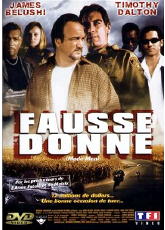
I found James Belushi’s performance in this fine shoot-em-up comedy crime caper to be a work of art, and I’m not kidding. Rated R for good reason (language and flying bullets), I enjoyed every minute of it. (Well, not every minute, but you have to allow me a small bit of exaggeration in the first paragraph of a review, don’t you?)
Belushi plays Bill “The Mouth” Mannuci, a guy on the run from the mob, and he’s not the only reason the mob’s after him. He took a stash of 12 million dollars with him.
I’m not sure where the small country town is that he’s holed up in, along with Debra, his ultra-shapely girl friend (Vanessa Angel), but it might be Iowa (lots of corn), Oklahoma (crooked small-town sheriff, played by Timothy Dalton), or Michigan (hidden meth labs way out in the sticks), but it probably doesn’t matter. I’m sure you have the idea already.
It is the kind of country where blacks (including Michael Beach as Miles, one of the more intelligent mobsters after him) stick out like sore thumbs and have to mind their manners every step of the way.
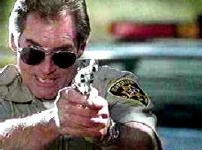
One wishes that Vanessa Angel might have had more screen time, but Timothy Dalton in his more immediate post-Bond days is a revelation of his own, playing against type, you might say, in more ways I might have thought possible.
But James Belushi plays his part to perfection: a crook, a liar, a thief, and a guy possessed with a natural gift of gab, talking away incessantly, possessing the mouth of a pure-born salesman, selling his various stories to anyone who would believe him along the way. Including me. He sure had me leaning the wrong way more than once.
In any case, a combination of better-than-average dialogue and production values with a minimum of actual bloodshed (in comparison with all of the shooting) makes this movie the top half of a drive-in double feature by far, not the bottom. If there were drive-in theaters any more.
I miss them.
Wed 17 Dec 2008
Included in this post are authors in the A-C section of the online Addenda to the Revised Crime Fiction IV, by Allen J. Hubin.
In all likelihood, this will be the last of these posts I’ll do on the blog. While I’m pleased with the results, it takes more time that it should to double post them. From now on, annotated additions and corrections like these will be found only on the primary CFIV website.
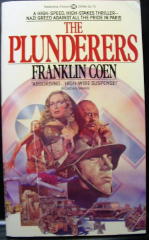
COEN, FRANKLIN. 1912-1990. US movie & TV screenwriter with many credits between 1936 and 1974. Add the second of the two books listed below. This now constitutes the author’s complete entry in the Revised Crime Fiction IV.
The Plunderers. Coward McCann, US, hc, 1980. Severn House, UK, hc, 1981. “A high-speed, high-stakes thriller – Nazi greed against all the pride of Paris.”
-Vinegar Hill. Rinehart, 1950. Setting: US South. TV movie: Art & Anne, 1995, as Deadly Family Secrets (scw: Brian Taggert; dir: Richard T.Heffron)
COFFEY, BRIAN. Pseudonym of Dean R. Koontz.
The Face of Fear. TV movie: CBS, 1990 (scw: Dean R. Koontz, Alan Jay Glueckman; dir: Farhad Mann)
COLE, ALEXANDER. Pseudonym of Justin Scott, q.v. Other pseudonym: J. S. Blazer; add new pseudonym: Paul Garrison. As “Alexander Cole,” the author has only one entry in the Revised Crime Fiction IV. See below:
The Auction. Jove, US, pb, 1983. Add British edition: Granada, hc, 1985, as by Justin Scott. “Kidnapped. The most valuable man in the world. The bidding starts at $5 million…”
COLE, MARTINA
The Jump. TV movie: BBC, 1998 (scw: Martina Cole; dir: Richard Standeven)
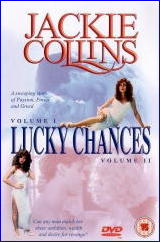
COLLINS, JACKIE. Pen name of Jacqueline Collins Lerman, 1941- . Prolific bestselling author; much of her fiction has criminous components. Add the second of the two novels below.
Chances. Partial basis for TV movie [mini-series]: NBC, 1990, as Lucky/Chances (scw: Jackie Collins; dir: Buzz Kulik). SC: Lucky Santangelo (Nicollette Sheridan), Gino Santangelo (Vincent Irizarry)
Lucky. Simon & Schuster, hc, 1985; Collins, UK, hc, 1985. SC: Santangelo family; setting: Las Vegas, NV. Partial basis for TV movie [mini-series]: NBC, 1990, as Lucky/Chances (scw: Jackie Collins; dir: Buzz Kulik). SC: Lucky Santangelo (Nicollette Sheridan), Gino Santangelo (Vincent Irizarry)
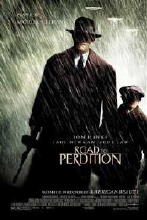
COLLINS, MAX ALLAN
The Road to Perdition. Film: Dreamworks, 2002 (scw: David Self; dir: Sam Mendes)
COLLINS, WILKIE
Basil. Film: Kushner-Locke, 1998 (scw & dir: Radha Bharadwaj)
The Moonstone. TV movie: BBC/PBS, 1996 (scw: Kevin Elyot; dir: Robert Bierman)
The Woman in White. TV movie [series episode/Dow Hour of Great Mysteries]: NBC, 1960 (scw: Frank Ford; dir: Paul Nickell)
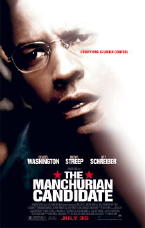
CONDON, RICHARD
The Manchurian Candidate. Film: Paramount, 2004 (scw: George Axelrod; dir: Jonathan Demme)
CONNELLY, MICHAEL
Blood Work. Film: Warner, 2002 (scw: Brian Helgeland; dir: Clint Eastwood)
CONRAD, JOSEPH
The Secret Agent. TV movie [mini-series]: BBC, 1967 (scw: Alexander Baron; dir: Gerald Blake). Also: BBC, 1992 (scw: Dusty Hughes; dir: David Drury)
-Victory. Doubleday, 1915; Methuen, 1915. Silent film: Paramount, 1919 (scw: Jules Furthman; dir: Maurice Tourneur). Sound film: Paramount, 1930, as Dangerous Paradise (scw: William Slavens McNutt, Grover Jones; dir: William A. Wellman). Also: Paramount, 1940 (scw: John L. Balderston; dir: John Cromwell). Also: Miramax, 1995 (scw & dir: Mark Peploe)
CONROY, A. L. This is this author’s only entry in the Revised Crime Fiction IV. [In spite of the similarity of names, there is no evidence to suggest that the author was Al Conroy, aka Marvin H. Albert.]
Storefront Lawyers. (Bantam, pb, 1970) Novelization of TV movie [series episode/Storefront Lawyers] entitled A Man’s Castle: CBS, 1970 (scw: unknown; dir: Lee H. Katzin)
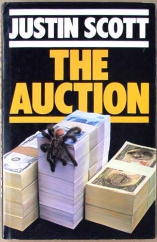
SCOTT, JUSTIN (BLAZER). 1942- . Pseudonyms: J. S. Blazer, Alexander Cole, q.v. Add pseudonym: Paul Garrison. His father, A. Leslie Scott, was the author of approximately 250 western novels, including many under several pen names; his mother, Lily K. Scott, wrote novels, many of them romances, as well as short stories for the slicks and pulp magazines. Also a novelist is his sister, Alison Scott Skelton. Under his own name, the author of many crime and detective novels included in the Revised Crime Fiction IV.
The Auction. Grafton, hc, 1985. Add: This is the British edition of a book published in the US earlier as by Alexander Cole, q.v.
Wed 17 Dec 2008
I CONFESS. Warner Brothers, 1953. Montgomery Clift, Anne Baxter, Karl Malden, Brian Aherne, O. E. Hasse. Screenplay: Paul Tabori, based on a play by Paul Anthelme. Director: Alfred Hitchcock.
Every movie director has a film or two that the general consensus is that they’re not among his best. That seems to be the case for I Confess, the last black and white movie that Hitchcock made, except for Psycho, as everybody who comments on this fact is equally quick to point out.

Filmed in Quebec and largely, if not entirely on location, it may be the subject matter that wasn’t fully understood, say some.
Montgomery Clift plays Father Michael William Logan, who’s put in a moral and ethical dilemma when a handyman for the church where he’s a priest confesses to a murder that he’s just committed.
Unable to reveal the killer’s identity to the authorities, represented primarily by the overly adversarial Inspector Larrue (Karl Malden), nor even a hint, Father Logan’s predicament becomes personal when he ends up accused of the crime himself, and still not able to say a word. (It may not have been intended, but I think Malden looks awfully devilish in the photo below. What do you think?)
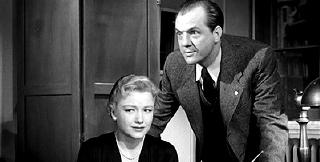
While I’m reluctant to say more, it seems that there was a girl in his past, and the girl knew the dead man.
And the real killer (O. E. Hasse), while panicky and frightened in the beginning, seems to take more and more pleasure in reminding Father Logan that he is not allowed to say a word.
The connections between the primary characters are in fact probably too complicated — there’s an over-reliance on coincidence, required only to make the story work — and Father Logan is probably too committed to his principles for audiences to understand. “Why doesn’t he … ?” they had to be thinking back then, when the movie first came out.
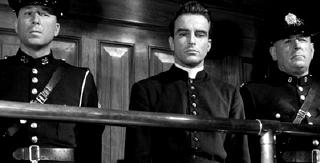
Not only then, but now, I admit it. Questions like these were certainly in my mind, and I didn’t have to work hard at it.
This, quite naturally, led to growing frustration with Mr. Hitchcock when there wasn’t (I felt) enough explanation or spelling out why indeed Father Logan doesn’t do this or that, or more correctly, can’t, even when the case goes to trial.
Most courtroom cases in the movies do not seem all at real, and this is another of them. I also didn’t care for the shootout scene at the end. Anything else? No, but other than the reservations I’ve already stated, I did like the movie, and maybe more than other people have. I even recognized Mr. Hitchcock’s portly profile at the beginning of the film, so I was also happy about that.
Tue 16 Dec 2008
I’ve recently split the previous A through H page of the online Addenda to Al Hubin’s Revised Crime Fiction IV into two sections, A through C and D through H. These entries obviously come from the A-C page, falling immediately after Agatha Christie’s entry:
CHRISTMAN, ELIZABETH. Add as a new author. 1914- . Ref: CA. Literary agent, 1946-69; faculty member at DePauw University, University of Notre Dame, 1969- .
-A Nice Italian Girl. Dodd Mead, hc, 1976. TV movie: Brut Productions, 1977, as Black Market Baby (scw: Andrew Peter Marin; dir: Robert Day)
CHRISTOPHER, MATTHEW F. Prolific author of sports novels for boys. The title below is his only entry in the Revised Crime Fiction IV.
Look for the Body. Phoenix Press, hc, 1952. Add setting: Midwest. Leading character: Brooks Carter, physician.
CHURCHILL, EDWARD. 1895-1972. Author of many stories in the pulp fiction magazines between roughly 1929 and 1952, plus one hardcover mystery novel cited in the Revised Crime Fiction IV. See below:
Menace of Death. Dodge, hc, 1937. Add settings: New Jersey, Washington D.C. Leading character: Captain Kirkland Crane of US Army Intelligence.
CLANCY, TOM
The Sum of All Fears. Film: Paramount, 2002 (scw: Paul Attanasio, Daniel Pyne; dir: Phil Alden Robinson). SC: Jack Ryan (Ben Affleck)
CLARK, MARY HIGGINS
● All Around the Town. TV movie: PAX, 2002 (scw: Peter Mohan; dir: Paolo Barzman)
● The Anastasia Syndrome and other stories. TV movie Lucky Day, based on ss in this collection: PAX, 2002 (scw: Peter Mohan; dir: Penelope Buitenhuis)
● Before I Say Goodbye. TV movie: PAX, 2003 (scw: Jon Cooksey, Ali Marie Matheson, John Benjamin Martin; dir: Michael Storey)
● The Cradle Will Fall. TV movie: Cates Films, 1983 (scw: Jerome Coopersmith; dir: John Llewellyn Moxey)
● A Cry in the Night. TV movie: Telescene, 1992 (scw & dir: Robin Spry)
● I’ll Be Seeing You. TV movie: PAX, 2004 (scw: John Benjamin Martin; dir: Will Dixon). [No writing credit given to Mary Higgins Clark.]
● Let Me Call You Sweetheart. http://imdb.com/title/tt0129198/: Family Channel, 1997 (scw: Christopher Lofton; dir: Bill Corcoran)
● Loves Music, Loves to Dance. TV movie: PAX, 2001 (scw: Peter Mohan; dir: Mario Azzopardi)
● Moonlight Becomes You. TV movie: Family Channel, 1998 (scw: David Kinghorn; dir: Bill Corcoran)
● My Gal Sunday. TV movie A Crime of Passion, based on ss in this collection: PAX, 2003 (scw: John Benjamin Martin, Carl Binder; dir; Charles Wilkinson)
● Pretend You Don’t See Her. TV movie: PAX, 2002 (scw: Donald Hounam; dir: Rene Bonniere)
● Stillwatch. TV movie: CBS, 1987 (scw: Laird Koenig, David E. Peckinpah; dir: Rod Holcomb)
● We’ll Meet Again. TV movie: PAX, 2002 (scw: Michael Thoma, John Benjamin Martin; dir: Michael Storey)
● Weep No More, My Lady. TV movie: CBS, 1992 (scw: Michel Andrieu, Leila Basen, Robert Levine; dir: Andrieu)
● While My Pretty One Sleeps. TV movie: Hallmark/Family Channel, 1997 (scw: David Kinghorn; dir: Jorge Montesi)
● You Belong to Me. TV film: PAX, 2001 (scw: Irina Diether; dir: Paolo Barzman)
CLEWS, ALAN. Add as a new author. British television and film screenwriter.
A Child of Air. Headline, UK, hc, 1995. Setting: Scotland. [“An old-fashioned ghost story of rolling mists, Scottish lairds, and something nasty behind the curtains.” Storyboards for a proposed film can be found online.]
COE, CAPTAIN. Joint pseudonym of Edward Card Mitchell and Lincoln Springfield, 1865- . Author of one title cited in the Revised Crime Fiction IV. Add year of birth of the latter author; death date unknown.
The Coroner’s Understudy. Arrowsmith, UK, hc, 1891.
Mon 15 Dec 2008
Part I was posted about a week ago. Here’s the same introduction I used as a prologue and an explanation back then: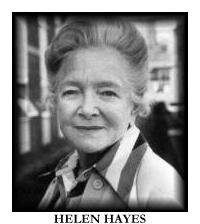
Note that the movies listed below, each based on an Agatha Christie novel or short story, are only those which are not included in the original Crime Fiction IV, by Allen J. Hubin. (They are included in the Revised CFIV, but not in this expanded version, as well as the online Addenda, where they also are.)
For more information on each of the movies or TV series episodes mentioned, follow the links provided to their corresponding IMDB entries.
CHRISTIE, AGATHA
● The Man in the Brown Suit. TV movie: Warner, 1989 (scw: Carla Jean Wagner; dir: Alan Grint). SC: Colonel Race (Ken Howard)
● The Mirror Crack’d from Side to Side. TV movie: BBC/A&E, 1992, as The Mirror Crack’d (scw: T. R. Bown; dir: Norman Stone). SC: Miss Marple (Joan Hickson)
● The Moving Finger. TV movie: BBC/PBS/A&E, 1985 (scw: Julia Jones; dir: Roy Boulting) . SC: Miss Marple (Joan Hickson). Also: Granada, 2006 (scw: Kevin Elyot; dir: Tom Shankland). SC: Miss Jane Marple (Geraldine McEwan)
● The Mystery of the Blue Train. TV movie: Granada, 2005 (scw: Guy Andrews; dir: Hettie MacDonald). SC: Hercule Poirot (David Suchet)
● The Murder at the Vicarage. TV movie: BBC/A&E, 1986 (scw: T. R. Bowen; dir: Julian Amyes). Also: ITV, 2004 (scw: Stephen Churchett; dir: Charles Palmer). SC: Miss Marple (Joan Hickson)
● Murder in Mesopotamia. TV movie [series episode]: A&E, 2001 (scw: Clive Exton; dir: Tom Clegg). SC: Hercule Poirot (David Suchet)
● A Murder Is Announced. TV movie: BBC/PBS, 1985 (scw: Alan Plater; dir: David Giles). SC: Miss Marple (Joan Hickson) Also: ITV, 2005 (scw: Stewart Harcourt; dir: John Stickland). SC: Miss Marple (Geraldine McEwan)
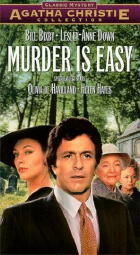
● Murder Is Easy. TV movie: CBS, 1982 (scw: Carmen Culver; dir: Claude Whatham)
● The Murder of Roger Ackroyd. TV movie [series episode]: BBC, 2000 (scw: Clive Exton; dir: Andrew Grieve). SC: Hercule Poirot (David Suchet). [The movie is reviewed here on the M*F blog.]
● Murder on the Links. TV movie [series episode]: London Weekend Television,1995 (scw: Anthony Horowitz; dir: Andrew Grieve). SC: Hercule Poirot (David Suchet)
● Murder on the Orient Express. TV movie: MediaVest, 2001 (scw: Stephen Harrigan; dir: Carl Schenkel). SC: Hercule Poirot (Alfred Molina)
● The Mysterious Affair at Styles. TV movie [series episode]: London Weekend/A&E/PBS, 1990 (scw: Clive Exton; dir: Ross Devenish). SC: Hercule Poirot (David Suchet)
● Nemesis. TV movie: BBC/PBS, 1987 (scw: T. R. Bowen; dir: David Tucker). SC: Miss Marple (Joan Hickson)
● The Pale Horse. TV movie: A&E, 1997 (scw: Alma Cullen; dir: Charles Beeson)
● Peril at End House. TV movie [series episode]: London Weekend Television,1990 (scw: Clive Exton; dir: Renny Rye). SC: Hercule Poirot (David Suchet)
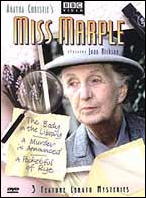
● A Pocket Full of Rye. TV movie: BBC/PBS, 1985 (scw: T. R. Bowen; dir: Guy Slater). SC: Miss Marple (Joan Hickson)
● Sad Cypress. TV movie [series episode]: London Weekend Television, 2003 (scw & dir: Dave Moore). SC: Hercule Poirot (David Suchet)
● The Secret Adversary. TV movie: London Weekend/PBS, 1982 (scw: Pat Sandys; dir: Tony Wharmby). SC: Tuppence & Tommy (Francesca Annis & James Warwick)
● The Seven Dials Mystery. TV movie: London Weekend Television, 1982 (scw: Pat Sandys; dir: Tony Wharmby). SC: Supt. Battle (Harry Andrews)
● The Sittaford Mystery. [Published in the US as Murder at Hazelmoor.] TV movie: Granada, 2006 (scw: Stephen Churchett; dir: Paul Unwin). SC: Miss Jane Marple (Geraldine McEwan). [Miss Marple did not appear in the book version. The film version seems to have been universally panned.]
● Sleeping Murder. TV movie: BBC/PBS, 1987 (scw: Kenneth Taylor; dir: John Davies) SC: Miss Jane Marple (Joan Hickson). Also: Granada, 2005 (scw: Stephen Churchett; dir: Ed Hall). SC: Miss Jane Marple (Geraldine McEwan)
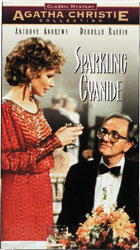
● Sparkling Cyanide. TV movie: CBS, 1983 (scw: Sue Grafton, Steve Humphrey, Robert Malcolm Young; dir: Robert Lewis). Also: ITV, 2003 (scw: Laura Lamson; dir: Tristam Powell). SC: Colonel Race (Oliver Ford Davies, as “Col. Geoffrey Reece”).
● Taken at the Flood. TV movie: Granada, 2006 (scw: Guy Andrews; dir: Andy Wilson). SC: Hercule Poirot (David Suchet)
● They Do It with Mirrors. TV movie: CBS, 1985, as Murder with Mirrors (scw: George Eckstein; dir: Dick Lowry). SC: Miss Marple (Helen Hayes). Also: BBC/A&E, 1991, as They Do It with Mirrors (scw: T. R. Bowen; dir: Norman Stone). SC: Miss Marple (Joan Hickson)
● Three-Act Tragedy. TV movie: CBS, 1986, as Murder in Three Acts (scw: Scott Swanton; dir: Gary Nelson). SC: Hercule Poirot (Peter Ustinov)
● Why Didn’t They Ask Evans? TV movie: London Weekend, 1980 (scw: Pat Sandys; dir: John Davies, Tony Wharmby)
● The Witness for the Prosecution. TV movie: CBS, 1982 (scw: Billy Wilder, Harry Kurnitz, Lawrence B. Marcus; dir: Alan Gibson)
Sat 13 Dec 2008
All of the books I reviewed in Mystery.File 1 are now online (and the reviews are all that Mystery.File 1 consisted of). I printed out two copies of this particular version of Mystery*File in January 1987. One went to my good friend and fellow mystery enthusiast, the late and greatly missed Ellen Nehr, in a letter dated January 16th, and I found the other here in a file folder not too long ago.
It’s possible I used the reviews in a DAPA-Em zine after that, but if I didn’t, they’ve seen the light of day for general consumption for the first time here on the M*F blog.
I didn’t add a letter grade to the books I reviewed in that issue, but to close out the issue, I ranked the books in order, according to how I enjoyed them at the time. “Keep in mind,” I said, “that this is very subjective — and subject to change from moment to moment ….”
1.
EDWARD S. AARONS – Assignment: Zoraya
2.
VICTORIA SILVER – Death of a Harvard Freshman
3.
GEORGE HARMON COXE – Murder for Two
4.
ALBERT CONROY – Devil in Dungarees
5.
L. A. TAYLOR – Only Half a Hoax
6.
JOHN PENN – A Deadly Sickness
7.
S. F. X. DEAN – Such Pretty Toys
8.
RICHARD S. PRATHER – Over Her Dear Body
9.
KARIN BERNE – False Impressions
10.
BOB McKNIGHT – Running Scared
11.
STEPHEN GREENLEAF – Beyond Blame
12.
TALMAGE POWELL – Man-Killer
13.
JAYNE CASTLE – The Chilling Deception
14.
FREDERICK D. HUEBNER – The Joshua Sequence
15.
THEODORA WENDER – Murder Gets a Degree
16.
NICK O’DONOHOE – Wind Chill
17.
BENJAMIN WOLFF – Hyde and Seek
The reviews in full can be found by using the search box in the column to the right of the text, if you so wish. (Rankings can tell you something, but not as much as you might think.) I enjoyed reading what I had to say back then, some 22 years ago, and I hope you have, too.
But there is nothing unusual in pointing out reviews that I’ve written that may have been seen by only two people. I have many reviews in my “archives” that have been seen by only one person (me), while others have been seen by up to a 100 or so, and when I was reviewing for the Hartford Courant (back in the 1970s), a hefty multiple of that, one hopes.
The very first issue of Mystery*File was dated only by the year, 1974. The second gave the month also: July 1974. The first version of M*F ran only 8 issues, including one numbered 5A, for what reason I no longer recall. Number 7 was dated May 1975.
There have been many start-ups and shutdowns along the way since then, including several changes of title, with Fatal Kiss being the most common. While of course there were articles and checklists in each that were contributed by other people, a good chunk of them had reviews in them that I’d written, usually a dozen or more at a time.
When I wasn’t publishing my own zine, my reviews appeared in Guy Townsend’s The MYSTERY FANcier and other zines, hundreds of them. (One full issue of TMF has been cannibalized, so to speak, with a big chunk of it having appeared here on the blog over the past year or so — not only my stuff, but by others who I’ve been able to track down and persuade that their past activities need not be hidden forever.)
And when I was between zines willing to print my reviews, I wrote them anyway, of movies as well as books, and they’re all in my files, never seen by anyone by me.
So with all of these old reviews of mine on tap and available, I’d never have to read another book or watch another movie to keep this blog going in the direction it’s been heading over the past few months.
I’ve never had a clear focus or goal in mind since I started the blog version of Mystery*File, and I think it’s about time I established one. I seem to be running out of steam in writing reviews of books I’ve recently read, but (as you may have noticed) I’ve found a whole new world of interest in collecting and watching movies on VHS or DVD, both old and new. And if not all of them have crime-related components, so be it.
(I suppose I could start another blog to review movies which aren’t criminous, but a number that aren’t have already been covered here, so it’s too late. A precedent has been set.)
Mixing them in with any new ones that I write, I’ll continue postng older, “archived” reviews and short articles (like George Kelley’s recent one about the Joe Gall series). Taken from old fanzines (of which I have a great supply on hand), most of this material has never been read by more than a couple of hundred people at the most, and with permission of the various authors, it’s time to make it available to the whole world via the Internet.
I’d love to do longer articles and author profiles, but I have too many interests and other obligations, and I no longer have the time. I’d gladly publish them here, but they’re going to have to be done by someone else.
So that’s the plan. It’s subject to change, but what in this world isn’t?
Fri 12 Dec 2008
JAYNE CASTLE – The Chilling Deception.
Dell, paperback original. First printing, August 1986.
Speaking of numbers of books sold, as I was in my preceding review of Richard S. Prather’s Over My Dear Body, Jayne Castle is no slouch in racking up sales, which were up to seven million in print at the time The Chilling Deception came out. (Ms. Castle is also known as Stephanie James and Jayne Ann Krentz, which also happens to be her real name.)
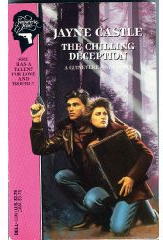
That many of her books are romances without a hint of mystery to them makes no difference at all, especially to the IRS and other more mortal bean-counters. [Jayne Krentz is also Amanda Quick, under which name many of her more mystery-oriented books have appeared, but she didn’t use that name until several years after this review first appeared.]
Prompted, I assume, by the success of such TV series as Remington Steele and Moonlighting, in which the pseudo-romance between the leading characters is featured as prominently as the detective story itself, book publishers (never ones not to sense a dollar when a dollar is there) have decided to get in on the action. Hence, the second of the adventures of Guinevere Jones, exclusive secretarial assistant, and Zachariah Justis, sophisticated security specialist.
They have a romance going — or more properly, perhaps, an affair — and in between trying to help their combined client in this book out from whatever trouble he is in — he won’t tell them — Guinevere is trying to pin Zach down as to what exactly their relationship is, and Zach, he’s simply trying to pin Guinevere down. In bed, that is.
There is more explicit sex in this book than in Richard Prather’s, say, and nothing else could be more indicative as to how times have changed. Swooning is hardly enough for today’s readers — and I imagine I’m talking about the female half of the population, for I don’t believe many males will read this book.
And if they do, they are likely to find the other scenes, those in which Guinevere and Zach talk (or, when they’re alone, think) about their relationship, something less than totally compelling. (I hope I’m not maligning men too much.)
I have little idea how the aforementioned female half of the population will go for this book and this series, except to say that a track record of seven million books is quite a record to build on.
— From Mystery.File 1, January 1987 (greatly revised).
[UPDATE] 12-12-08. There were in all four books in the series. They all came out in 1986. Expanded from the Revised Crime Fiction IV, by Allen J. Hubin, here’s a complete list:
JONES, GUINEVERE
o The Desperate Game (n.) Dell, pbo, June 1986.
o The Chilling Deception (n.) Dell, pbo, Aug 1986.
o The Sinister Touch (n.) Dell, pbo, Oct 1986.
o The Fatal Fortune (n.) Dell, pbo, Dec 1986.
She has her own page on the Thrilling Detective website, devoted to private eyes of all kinds, but other than that, I don’t know how successful the series was.
Except for this. If you were to search for any of these four books on Amazon, which is where you will find the most accurate prices books are really going for, you will find only one for which the asking price is less than $22.50, and I’m willing to wager that that one book won’t last long at that price.
Apparently none have been reprinted. If that’s so, one wonders why, as the market for Jayne Ann Krentz’s fiction seems to know no bounds. If her total was seven million books in print in 1986, one can only imagine what it is now.
Fri 12 Dec 2008
THE MIGHTY BARNUM. 20th Century, 1934. Wallace Beery, Adolphe Menjou, Virginia Bruce, Rochelle Hudson, Janet Beecher, George Brasno, Olive Brasno. Screenwriter, based on his play: Gene Fowler; director: Walter Lang.
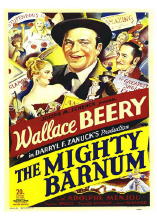
I ordered some Edgar Wallace movies on DVD from an online dealer, and he sent me a packet of Wallace Beery instead. Not good, as I have never been a Wallace Beery fan, but the dealer said to keep them and said he’d send me the Wallace movies anyway.
To make a long story short, I never did get the Edgar Wallace movies. He sent another set of DVDs entirely, but these were ones I didn’t have and didn’t mind having, so I let things be. I won’t order from this fellow again, though.
I’ve looked up Wallace Beery on the Internet to learn, as I knew in general but not in specific, that he was a very bankable star in the silent film era — and into the 1930s as well, having only a small difficulty in the transition. He spoke in a slow, drawling voice and had a mild propensity for mugging while on camera. (Keep in mind I’m using only The Mighty Barnum to gauge from, but many of the sources I found online say much the same thing.)
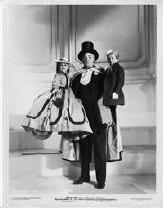
In any case, he’s likeable enough, and unless you require accuracy in your biographical movie watching, The Mighty Barnum is entirely acceptable as light entertainment. If there ever was a man whose life could be played for laughs, without being a comedian himself, it would have been P. T. Barnum.
Mentioned (and seen) in the film, among others, are Madame Zorro, the Bearded Lady; Jumbo the Elephant; Col. Tom Thumb and his wife Livinia (played by George Brasno, a midget himself, and his sister Olive); and Jenny Lind (the lovely Virginia Bruce), the source of Barnum’s greatest triumph, and (according to the movie, at least) his greatest disaster. (I wonder if Virginia Bruce did her own singing. I’ve yet to find a source that says whether or not, definitively.)
Everything is all scrambled around chronologically, from all accounts, and not even the name of Barnum’s partner in the Barnum & Bailey Circus, which came along later than the events in the movie, is given correctly.
« Previous Page — Next Page »




